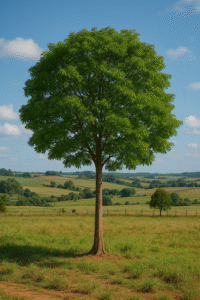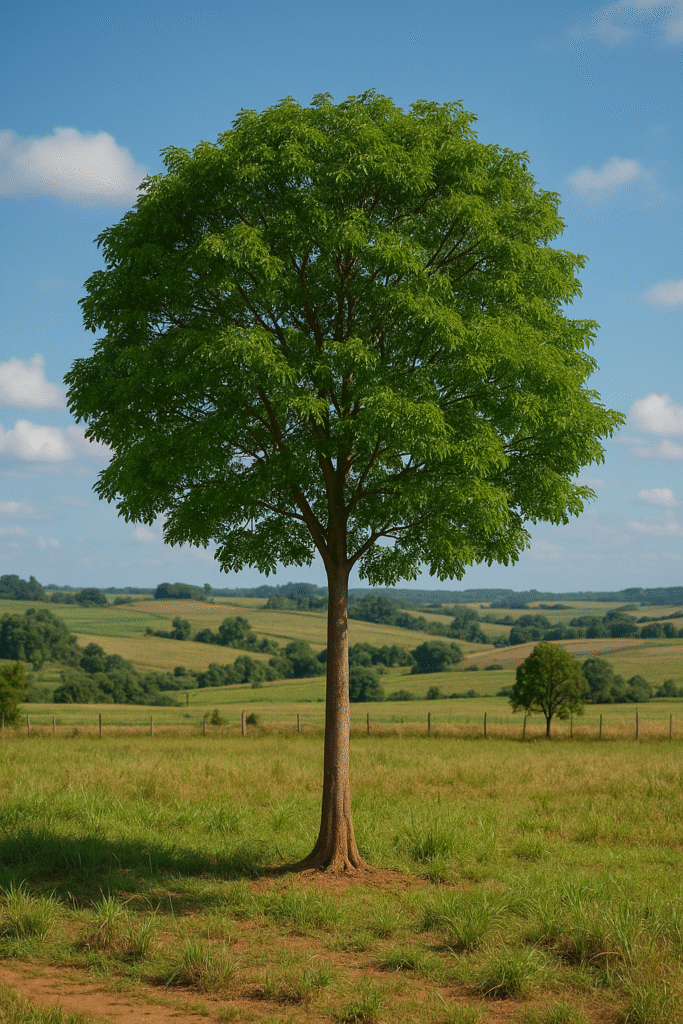The marupa tree (Simarouba amara) is a fast-growing, tropical tree native to South America, particularly common in Brazil’s Amazon and Cerrado regions. Belonging to the Simaroubaceae family, this medium-sized tree is widely recognized for its light wood, adaptability, and ecological importance in reforestation and land restoration projects.
In this article, you’ll learn what the marupa tree is, its key characteristics, uses, and why it is increasingly seen as a sustainable solution in both rural and urban areas.
🌳 What Is the Marupa Tree?
The marupa tree is a medium to large-sized tropical tree that typically reaches 10 to 25 meters (33 to 82 feet) in height. It has a straight, cylindrical trunk and a broad, open canopy, allowing sunlight to pass through and support surrounding biodiversity.
Marupa thrives in warm, humid climates and grows exceptionally fast, which makes it highly valuable for reforestation programs and timber production. It is also used in traditional medicine by indigenous communities in the Amazon.
🌱 7 Main Characteristics of the Marupa Tree
Here are the seven most important features of the marupa tree:
1. Fast Growth Rate
Marupa trees are known for their rapid development. In optimal conditions, they can grow up to 3 meters (10 feet) within the first two years. This makes them ideal for commercial plantations and environmental recovery projects.
2. Light, Workable Wood
The wood of the marupa tree is light in color (usually yellowish or pale beige), low-density, and easy to work with. It’s commonly used for:
-
Furniture
-
Wooden packaging
-
Toys
-
Veneers and plywood
Though not naturally resistant to termites or fungi, it responds well to chemical treatments.
3. Adaptability to Different Soils
One of marupa’s greatest strengths is its adaptability. It grows well in poor or degraded soils, including eroded hillsides and abandoned pastures. It prefers well-drained soils but tolerates humidity well.
4. Traditional Medicinal Uses
The bark and leaves of the marupa tree have been traditionally used to treat digestive issues, fevers, parasitic infections, and inflammation. Herbal infusions are still used by some rural and indigenous communities across the Amazon region.
5. Ecological Importance
Because of its open crown and fast growth, the marupa tree plays a crucial role in forest regeneration. It helps stabilize the soil, provides shelter for wildlife, and contributes to the recovery of native biodiversity in degraded areas.
6. Easy Cultivation
Marupa can be propagated from seeds or seedlings, with a high germination rate and low maintenance needs. It is a preferred species in government and NGO-sponsored reforestation projects.
7. Low Maintenance Needs
Once established, the tree does not require fertilizers or irrigation. Its ability to thrive with minimal care makes it a cost-effective option for rural landowners and conservationists alike.
🌾 Is the Marupa Tree Grown Outside the Forest?
Absolutely. The marupa tree is widely cultivated outside of native forests, including in:
-
Rural farms: as windbreaks, shade trees, and timber crops
-
Reforestation areas: to restore degraded or eroded lands
-
Urban landscaping: in parks, along roadsides, and in institutional gardens
-
Agroforestry systems: combined with food crops like cassava or banana
Its adaptability and usefulness make it an attractive species for small farmers, sustainable logging, and environmental NGOs.
🪵 Practical Uses of the Marupa Tree
The marupa is incredibly versatile and has both economic and environmental value:
🔨 Industrial Uses:
-
Lightweight furniture
-
Wooden crates and packaging
-
Interior panels and doors
-
Musical instruments
🌿 Medicinal Uses:
-
Bark tea for digestive support
-
Antiparasitic infusions
-
Anti-inflammatory remedies
🌳 Environmental Uses:
-
Soil protection and erosion control
-
Carbon capture and climate mitigation
-
Restoring biodiversity in deforested lands
🌍 Sustainability and Environmental Impact
Marupa is a key player in sustainable forestry and climate resilience. Unlike slower-growing hardwoods, it offers a renewable source of timber that can be harvested responsibly. Additionally, its role in carbon sequestration and soil restoration contributes to global environmental goals.
Because marupa trees grow quickly and reproduce easily, they reduce pressure on endangered native species and encourage economically viable conservation.
📌 Conclusion
The marupa tree is much more than just a fast-growing tropical species. It represents a bridge between economy and ecology—serving small farmers, industries, and environmental initiatives alike. Whether used for light timber, ecological restoration, or natural medicine, marupa proves that sustainable forestry can be both profitable and impactful.
Its adaptability, low maintenance, and multiple applications make it one of the most promising native trees for reforestation, agroforestry, and rural development across tropical regions.

🌱 Maximize the Health of Your Plants with Precision!
Whether you’re caring for marupa seedlings or maintaining a thriving garden, knowing exactly what your soil needs is essential. This advanced 4-in-1 Soil Moisture Meter helps you monitor temperature, moisture, pH levels, and sunlight intensity — all in real time. With its easy-to-read LCD backlight display and portable design, it’s the perfect tool for gardeners, farmers, and nature lovers who want to grow healthier, stronger plants.
🌿 Grow Smarter, Even in Small Spaces!
Limited space doesn’t mean limited greenery. Discover practical strategies to grow lush, healthy plants in small environments — from balconies and patios to tight indoor corners. Learn how to optimize sunlight, choose the right containers, and keep your soil balanced with simple tools like the 4-in-1 Soil Meter.

